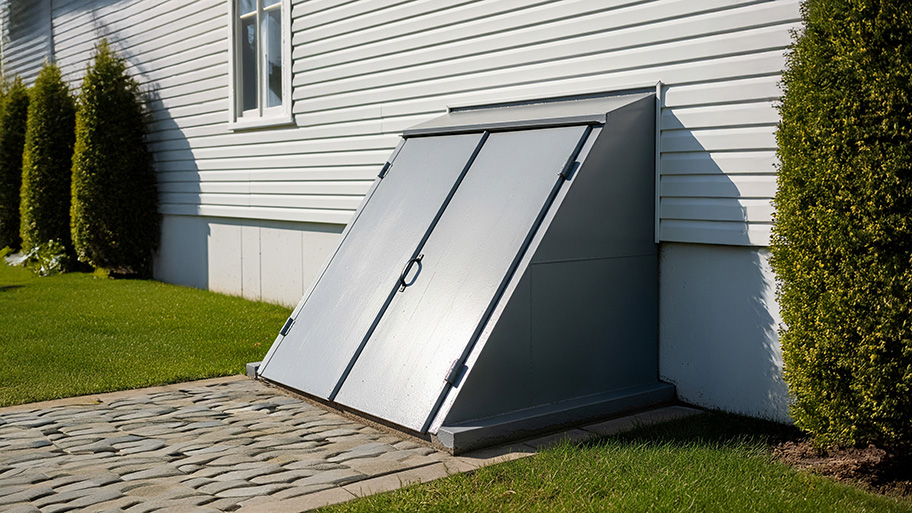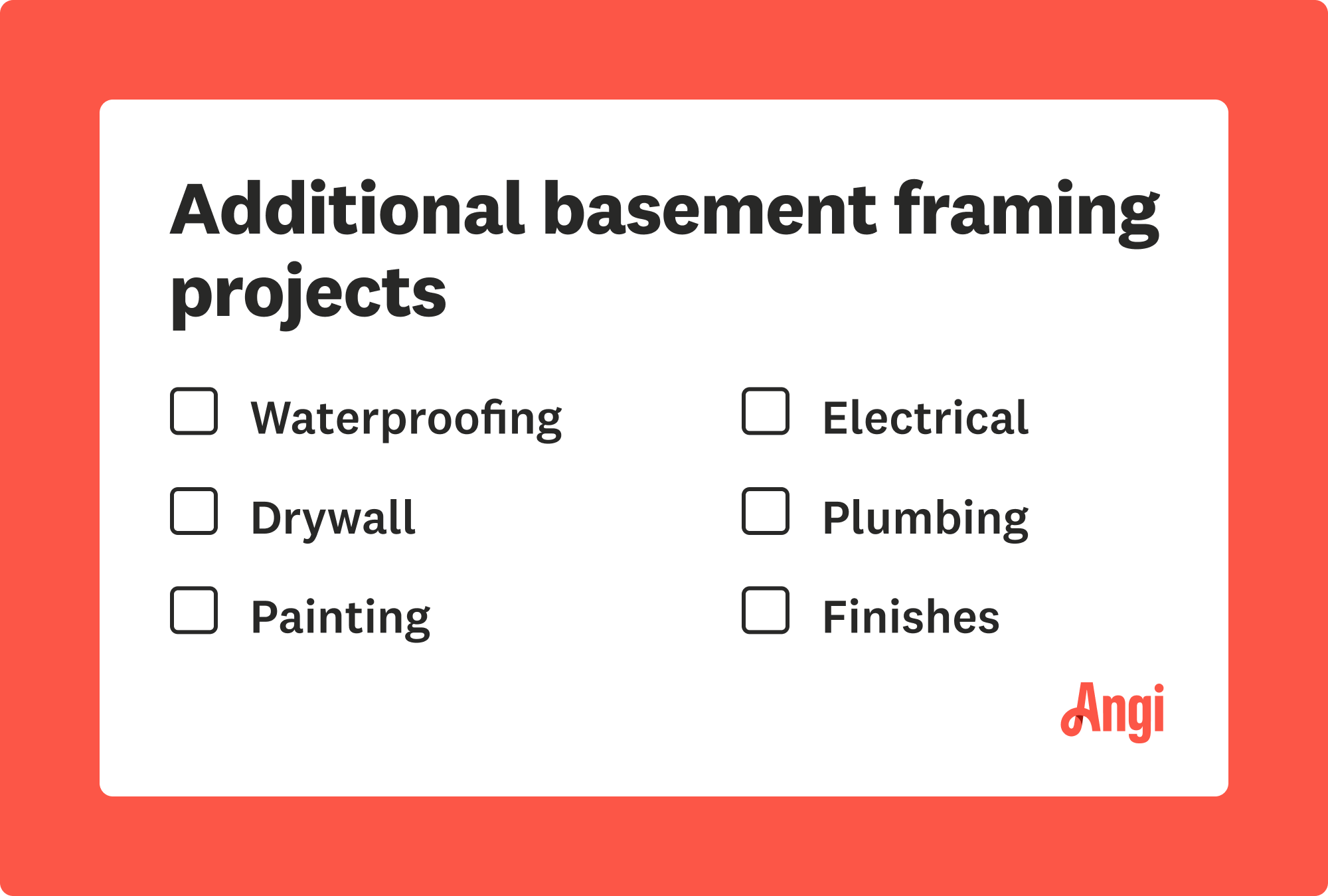
When storm season is approaching, ensure you’re ready to go in case of an emergency. Explore our guide to budgeting for bulkhead replacement costs.
The cost to frame a basement is $1,200 on average, but it can cost between $500 and $1,600 or more depending on the size and details of the space.


The size of your basement and the add-on features influence your total more than any other factors.
You can expect to pay between $2 and $10 per linear foot to frame a basement and install drywall.
Vapor barriers and insulation will add between $4 and $12 per square foot, but they make the space safer, more comfortable, and more efficient.
Many municipalities require permits to finish a basement, so confirm local costs and budget for this expense, too.
Finished basements add value to your home, as well as comfort and space. What homeowner wouldn’t love extra square footage to enjoy hobbies or host guests? If you've decided to finish your basement, the first step is to frame it. It costs an average of $1,200 to frame a basement, which includes installing drywall and insulation. Most homeowners spend between $500 and $1,600 on the project. Basic framing without the drywall costs about $3 to $6 per linear foot typically, but you may need to add between $5 and $10 per linear foot to that price if you include the drywall. Let’s take a closer look at the total costs involved with framing a basement.
A finished basement is a popular renovation that adds value to a home and expands its livable square footage. Before you can consider all your favorite finishes, though, you need to add basic framing around the outside of the room and enclose the interior walls. The basement walls frames will host insulation, wires, drywall, and all of your chosen finishes.
The cost to frame a basement will primarily come down to its size. The larger the basement, the more linear feet required to cover its walls. Additionally, if you opt to include internal walls—and not an open floor plan—you must increase the estimated number of linear feet for your walls.
On average, you'll pay between $2 and $10 per linear foot of wall to frame a basement, depending on whether we're including the cost to add drywall. The framing and the drywall range between $5 and $10 per linear foot, while installing the treated lumber alone costs between $2 and $6 per linear foot.
Cost to Frame a Basement Per Linear Foot
| Size (Linear Feet) | Framing Only | Framing + Drywall |
|---|---|---|
| 500 | $1,000 – $3,000 | $2,500 – $5,000 |
| 750 | $1,500 – $4,500 | $3,750 – $7,500 |
| 1,000 | $2,000 – $6,000 | $5,000 – $10,000 |
| 1,500 | $3,000 – $9,000 | $7,500 – $15,000 |
| 2,000 | $4,000 – $12,000 | $10,000 – $20,000 |
Learning how to finish a basement wall is an advanced DIY, but it can be helpful to know the cost of materials alone if you're considering this route. You will primarily need treated two-by-four cuts of lumber that are protected against moisture and susceptibility to pests. Similar to the cost to frame a house, the cost of lumber ranges between $1 and $5 per linear foot of wall.
Before you embark on finalizing your budget, it's important to hire the right pro to finish your basement. Labor alone adds another $1 and $5 per linear foot of wall, accounting for 50 percent of the total cost. Keep in mind that most basement contractors will charge a flat fee for the entire project including the other finishing elements. For example, within the scheme of finishing a basement entirely, labor only accounts for about 20 percent of the total cost.
You will certainly need to include the cost of a building permit in your total price to frame a basement. Local permits for converting basements and attics typically range between $1,200 and $2,000. Always check with your contractor, local building codes, and your HOA before tackling large projects such as finished basements.
Basements generally come in three types: masonry wall, precast panel, and poured concrete wall. Here is how much it costs to frame each of these.
You will typically pay about $10 to $12 per linear foot of wall area for a masonry wall basement. This involves building a wood-framed concrete wall, and then a frame extending from the wall that is fastened to the ground.
A poured concrete wall basement is a little more expensive at $12 to $16 per square foot. How thick you want the walls to be and the layout of the basement will affect whether you’re at the higher or lower end of the price spectrum.
Framing for a precast panel basement is less expensive than poured concrete, so it will only cost you between $8 and $12 per linear foot in most cases. The advantages of these types of basements are that they are waterproof, better insulated, and fitted better than poured basements. They're also a lot quicker to install because they're precast.
Framing a basement is rarely a standalone project. It is typically the first step in the finishing process. Let’s walk through the additional costs to finish a basement that comes before and after the framing.
Before closing up the bare basement walls, it is critical to ensure your basement is properly waterproofed. Waterproofing a basement costs between $5 and $10 per square foot, but this step will hopefully be in place before you begin. In some cases, you will only need to add extra drainage to the floors or an extra coat of waterproof paint.
Adding drywall costs an additional $3 to $4 per linear foot for the full wall. You can hang drywall yourself for a simpler project, since the framing is already in place. If you have a large finished basement wall that requires space for windows and electrical outlets, you should leave it to the professionals.
With the drywall in place, you can hire a pro to paint your basement walls for an average cost of $1,800. On average, painting a room costs between $2 and $6 per square foot, but doing it yourself lowers the cost to just the price of paint. A gallon costs anywhere from $20 and $100.
Equipping your basement with an electrical panel, outlets, and proper wiring will cost up to $4,000, depending on the existing setup. For example, you may need to increase your electrical capacity if you plan to turn your basement into a game or entertainment room. Additionally, be sure to consider lighting fixtures, which will cost about $360 each.
When you transform your basement into a comfortable living space, having access to a bathroom, kitchenette, or small wet bar is the dream. The cost to add a bathroom is an average of $15,000, with the cost of the rough-in plumbing alone about $6,500. Building a bar in your basement, on the other hand, adds about $8,000 extra.
The basic comforts that give your basement a finished look go beyond drywall and paint. Flooring will range from $3 to $22 per square foot, including everything from DIY laminate to hardwood flooring. Additionally, building and finishing the ceiling adds an average of $1,600, depending on whether you opt for a drywall or drop ceiling. Finally, trim around your floors and ceiling costs between $4 and $6 per linear foot including the cost of installation.

Because labor takes up about half the costs of framing a basement, you could reduce your costs for the project to $1 to $3 per linear foot for basic framing, and $4 to $8 per linear foot for framing that includes drywall. That means on a typical basement that involves 200 linear feet of framing, you would pay between $200 to $800 for materials to do the job.
Keep in mind that if you've already hired a contractor to finish the basement, you may save money on typical labor costs by just having them do that job as well. Contact a basement professional near you for a quote to see if that will be true in your case, which could save you a lot of work, time, and money down the road.
Here are some suggestions to help you save money when framing a basement.
You'll need drywall or plywood for framing your basement. Typically drywall is a little less expensive than plywood, but if you shop around you might be able to find a deal on one or the other.
If you can take some of the smaller preparation tasks off the contractor’s hands, you could save some money on labor. Here are a few things you could probably do on your own with a little research:
Plug existing holes to prevent moisture from entering the space.
Put up insulation.
Build wood grids that the drywall will attach to.
Then, you can leave the heavy drywall installation to the pros.
Get at least three quotes from basement pros before booking. Ask each contractor how they will approach this project—this will help you spot a bad basement remodeler.
According to data from Angi, most homeowners are looking for input from a professional, with around 57% wanting a recommendation and 37% of homeowners wanting sketches or a basic idea for a project. Take a look at how other homeowners feel about prep for a basement remodel.
From average costs to expert advice, get all the answers you need to get your job done.

When storm season is approaching, ensure you’re ready to go in case of an emergency. Explore our guide to budgeting for bulkhead replacement costs.

The cost of installing a wine cellar varies based on square footage, the type of wine cellar or wine cave, materials used, where it is located in the property, and where you live. Use this guide to find how much your wine cellar will cost.

A basement bar can add value to your home and serve as a great place to entertain. Use this guide on the cost to build a bar in your basement to get started.

Creating ceilings in a finished basement can make the space more enjoyable, but also introduce some challenges. Understanding all your basement ceiling options is helpful.

When it comes to creating a downstairs oasis, knowing who to hire to finish your basement is key. Here's how to find the best professional for the job.

Thinking of refinishing your basement and looking for basement remodel ideas? Check out 25 ways to transform your subterranean space.